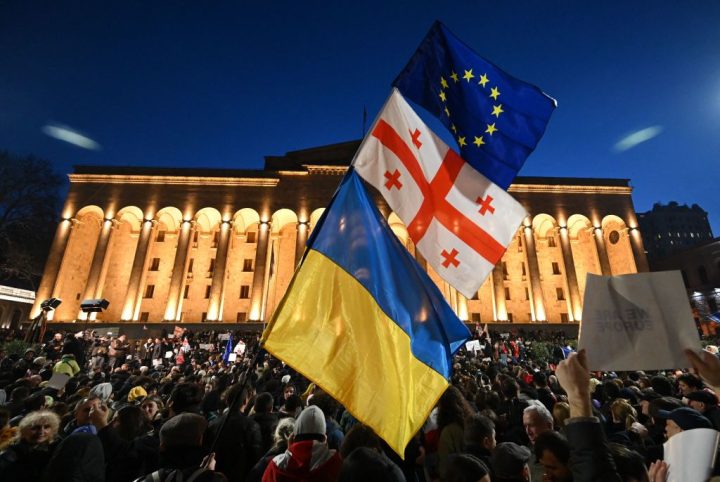Protests that broke out in Tbilisi against adopting a controversial Russian-style law have turned into a pro-European movement with political demands. The law could have seen media and non-government groups which take funding from abroad classed as ‘foreign agents’. Although the Georgian government has released all arrested protesters and dropped the proposed law, which copied repressive Russian legislation and threatened to ban NGOs and independent media from operating in the country, the opposition is now demanding the resignation of the current Georgian government – along with early elections.
Looking at the EU flags raised by upset Georgians, Ukrainians are comparing the rallies in Tbilisi with the 2014 Maidan revolution in Kyiv. Back then, former Ukrainian president Viktor Yanukovych refused to sign a political association and trade agreement with the EU, instead choosing closer ties with Russia. Georgians have taken to the streets for similar reasons, fearing that adopting the law on ‘foreign agents’ would mean the end of the country’s long-standing aspirations to join the EU and would shift the country towards authoritarianism. Russia’s ministry of foreign affairs in Crimea has already warned the Georgian demonstrators to ‘recall a similar situation in Ukraine in 2014 and what it finally led to’. (Russia invaded Crimea and Donbas after the Maidan revolution succeeded.)
Tbilisi fears the Kremlin could decide to invade Georgia if it sides with Ukraine
Although the Russian law on ‘foreign agents’ was repelled, activists in Tbilisi say the battle is far from over. ‘We are willing to defend our democracy, freedom, and European future from Russia or the Russian-backed Georgian government,’ wrote Nodar Rukhadze, a Georgian activist and journalist. Georgia and Moldova applied for EU membership immediately after Ukraine in March last year. Georgia was not granted candidate status because its democracy didn’t meet the criteria. It was given a set of reforms by the European Commission which should be implemented before it can be considered as a candidate for membership.
Ukrainians draw historical parallels between themselves and Georgia. The Kremlin unleashed a war against Georgia in 2008, which lost the country 20 per cent of its territory. Today Moscow keeps a political and military presence in the occupied territories of South Ossetia and Abkhazia. Both have become large military bases that Russia uses to project power across the region, although some troops were deployed to fight the war against Ukraine.
Ukrainian and Georgian people have always had a close relationship: Ukraine was the first country who aided Tbilisi when Russia invaded. For this reason, in February last year, Kyiv counted on Georgia to step up for Ukraine. Ordinary people did by attending thousands of rallies in support of Ukraine, and about 1,500 Georgians volunteered in Ukraine’s army. But officials in Tbilisi refused to impose sanctions against Russia or to provide military aid to Ukraine. Georgia also refused to return the Buk air defence systems it received from Kyiv in 2008 to defend the sky from Russian missiles.
While having a close relationship with Moscow, Tbilisi fears the Kremlin could decide to invade Georgia if it sides with Ukraine. But there are other factors. Georgia’s decision to withhold aid is not only driven by a desire to avoid another invasion, but is also a demonstration of loyalty to the Kremlin. Russia is an important trade partner for Georgia, which the current government doesn’t want to sacrifice; the Georgian economy has grown over the past two years. Last year, according to the National Bank of Georgia, Russians transferred about $2 billion to the country – ten times more than in 2021. Some 112,000 Russians fled from mobilisation to Georgia, giving an unexpected boost to its economy.
For the past few days, demonstrators who gathered near the Georgian parliament held the flags of the EU, Georgia and Ukraine and played the national anthems of both countries, once again demonstrating that Ukrainians and Georgians have a common enemy: Russia. But the Georgian authorities don’t agree with the country’s citizens. Volodymyr Zelensky thanked the Georgian people for supporting Ukraine, saying that all free nations of Europe deserve to be in the EU, and that ‘there is no Ukrainian who would not wish success to our friendly Georgia’. Ukrainians believe that if pro-EU movements succeed in Georgia and Moldova, Russia will begin to lose supporters in other post-Soviet countries which are still afraid to rise up against the Kremlin.
Sign up to The Spectator’s weekly Ukraine in Focus newsletter here.







Comments